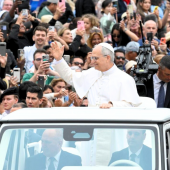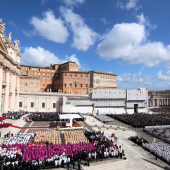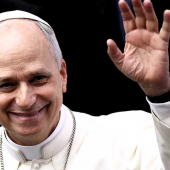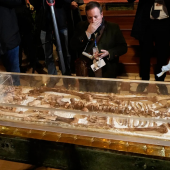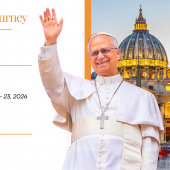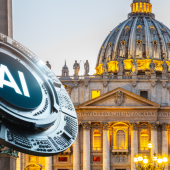Five cardinals to participate in third conclave
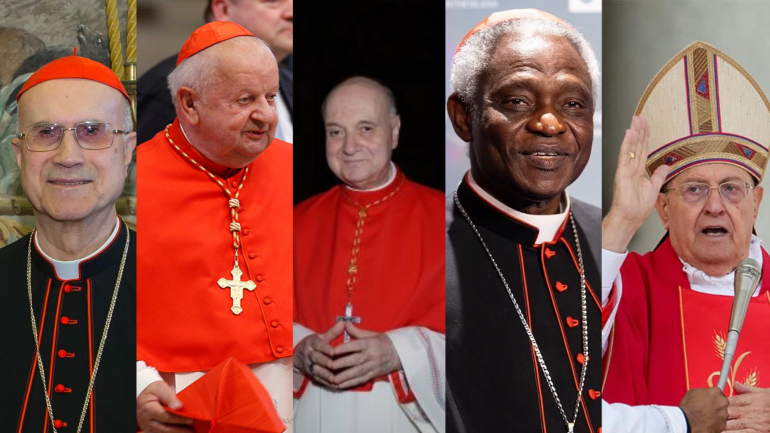
Only five cardinals have the rare distinction of participating in the last two conclaves that elected Pope Benedict XVI and Pope Francis. These same five will now once again take part in the upcoming conclave to elect the next pope.
The five cardinals who will be participating in their third conclave — having previously voted in both the 2005 conclave (which elected Pope Benedict XVI) and the 2013 conclave (which elected Pope Francis) — are:
-
Cardinal Leonardo Sandri (Argentina)
-
Cardinal Angelo Comastri (Italy)
-
Cardinal Tarcisio Bertone, SDB (Italy)
-
Cardinal Stanisław Dziwisz (Poland)
-
Cardinal Peter Turkson (Ghana)
-
Cardinal Leonardo Sandri of Argentina, born on November 18, 1943, in Buenos Aires and ordained a priest on December 2, 1967, was created cardinal on November 24, 2007. He has served the Church in numerous capacities, including as Prefect of the Congregation for the Eastern Churches (2007–2022), Vice Dean of the College of Cardinals since 2020, and Grand Chancellor of the Pontifical Oriental Institute. A key figure in Vatican diplomacy, Cardinal Sandri notably coordinated papal communications during the final years of Pope John Paul II's pontificate.
-
Cardinal Angelo Comastri of Italy, born on September 17, 1943, in Sorano, Tuscany, and ordained a priest on March 11, 1967, was elevated to the College of Cardinals on November 24, 2007. He served as Archpriest of St. Peter’s Basilica from 2006 to 2021, Vicar General for Vatican City State, and President of the Fabric of Saint Peter. Renowned for his deep spirituality, Cardinal Comastri gained global recognition during the COVID-19 pandemic for leading televised daily rosaries from inside St. Peter’s Basilica.
-
Cardinal Tarcisio Bertone, S.D.B., born on December 2, 1934, in Romano Canavese, Italy, and ordained a priest on July 1, 1960, was created a cardinal on October 21, 2003. He served as Secretary of State of the Holy See from 2006 to 2013, Archbishop of Genoa from 2002 to 2006, and Camerlengo of the Holy Roman Church from 2007 to 2014. A trusted Vatican diplomat, Cardinal Bertone was a close collaborator of both Pope John Paul II and Pope Benedict XVI.
-
Cardinal Stanisław Dziwisz, born on April 27, 1939, in Raba Wyżna, Poland, and ordained a priest on June 23, 1963, was made a cardinal on March 24, 2006. He served as Archbishop of Kraków from 2005 to 2016 and was the longtime personal secretary to Pope John Paul II from 1966 to 2005. Cardinal Dziwisz is widely recognized for his pivotal role in preserving the legacy of Pope John Paul II and overseeing the process leading to his beatification.
-
Cardinal Peter Kodwo Appiah Turkson, born on October 11, 1948, in Wassaw Nsuta, Ghana, and ordained a priest on July 20, 1975, was elevated to the cardinalate on October 21, 2003. He has served as Prefect of the Dicastery for Promoting Integral Human Development (2017–2021), President of the Pontifical Council for Justice and Peace (2009–2017), and currently serves as Chancellor of the Pontifical Academies of Sciences and Social Sciences. Cardinal Turkson is internationally respected for his leadership on issues of social justice, economic development, and environmental advocacy, and has often been seen as a potential papal candidate.
These cardinals have had the rare distinction of being part of three successive papal elections — a testimony to their longstanding service and significance within the Church.
Following the conclusion of the Novendiales—the traditional nine days of mourning for a deceased pope—on May 4, the cardinals will begin the conclave on May 7.
A total of 133 cardinal electors under the age of 80 have gathered at the Sistine Chapel to vote. The conclave date was finalized during the fifth general congregation of cardinals held on April 28.
The Pro Eligendo Romano Pontifice Mass (Mass for the Election of the Roman Pontiff) will take place at 10:00 AM Italian time on May 7 at St. Peter’s Basilica. Later that day, at 4:30 PM, 133 cardinals from 70 countries across five continents will begin voting.
The cardinals will first gather in the Pauline Chapel to chant the Litany of the Saints, then proceed solemnly to the Sistine Chapel.
Although 135 cardinals are under the age of 80, two—Cardinal Antonio Cañizares (Spain) and Cardinal John Njue (Kenya)—will not participate due to health reasons.
Before the voting begins, all participating cardinals will take a solemn oath to maintain secrecy and avoid external influence. Cardinals over 80 will then leave the chapel. A spiritual reflection on the responsibilities of the papacy will be delivered by 90-year-old Cardinal Raniero Cantalamessa, after which he and the head of liturgical celebrations will exit.
Cardinal Kevin Farrell, acting as Camerlengo, will supervise the proceedings, assisted by three cardinals selected by lot—one each from the orders of cardinal bishops, priests, and deacons. This team will rotate every three days.
Voting will take place twice each in the morning and afternoon for three days. If no pope is elected, a day will be set aside for prayer before voting resumes. Until a new pope is chosen, smoke will rise from the Sistine Chapel’s chimney at approximately 12 noon and 7 PM daily—black smoke for no result, white smoke signaling a successful election.
Strict secrecy will be observed during the conclave: no letters, phone calls, or media access are allowed unless in an emergency.
The conclave also marks the first time in history that cardinals from 13 countries—including Haiti, Cape Verde, Central African Republic, Papua New Guinea, Malaysia, Sweden, Luxembourg, East Timor, Singapore, Paraguay, South Sudan, Serbia, and Mongolia—will vote for a pope.
Among the 252 living cardinals:
-
114 are from Europe
-
37 from Asia
-
32 from South America
-
29 from Africa
-
28 from North America
-
8 from Central America
-
4 from Oceania
Of the 148 cardinals appointed by Pope Francis, 108 are under 80. Among those created by Pope Benedict XVI, 22remain eligible to vote. Five of the 41 cardinals created by St. John Paul II are also participating.
Notably, 33 of the voting cardinals belong to 18 religious congregations.
As the Church prepares to elect the 267th Successor of St. Peter, Catholics around the world are invited to offer prayersfor the guidance of the Holy Spirit in this historic moment.
Radio Veritas Asia (RVA), a media platform of the Catholic Church, aims to share Christ. RVA started in 1969 as a continental Catholic radio station to serve Asian countries in their respective local language, thus earning the tag “the Voice of Asian Christianity.” Responding to the emerging context, RVA embraced media platforms to connect with the global Asian audience via its 21 language websites and various social media platforms.









